Research galore: The big projects in UoM chemistry

Life here at the University of Manchester is exquisite, there are societies, the nightlife and of course the people.
In terms of chemistry, the rich history here cannot be understated; from our Nobel prize winners to our many breakthroughs, including valence theory and John Dalton’s atomic theory alongside many others.
More recently, our discovery of graphene is a great example of our thriving modern-day research.
With so many new students arriving, it is worth looking at what the academic staff who are going to be teaching them are involved in.
The three branches of chemistry are organic, inorganic, and physical, and UoM was actually one of the first organic chemistry institutions in the UK. As you might expect, researchers have recently been making terrific strides in this area.
Spectrometry:
The first exciting set of research involves spectrometry, which is a technique that helps scientists investigate different aspects of molecular structure.
One new method focuses on analysing the surface chemistry of solid organic material. Previous methods for this analysis only revealed information about 1% of the surface of the subject material, which puts a limit on investigation.
The use of the ‘C60’ molecule (commonly known as the Buckyball), a common fullerene, has reduced these limitations. This will revolutionise the industry of biochemical analysis and have economical benefits for companies that rely on analytical chemistry.

The second new spectroscopic method developed by the University of Manchester (we chemists like measuring stuff) has been adopted by many other institutions worldwide.
‘Diffusion ordered’ nuclear magnetic resonance spectroscopy (DOSY), was developed alongside research institute testing in over 60 countries.
DOSY is a useful method for effective, detailed analysis of complex mixtures like pharmaceutical products. It allows us to look at the composition of fine products and to better predict their properties.
Safer methods in drug productions:
Another area of research our chemistry department is impacting is pharmaceuticals, with our own professors developing safer, efficient methods in drug productions.
Fluorine,the lightest halogen, is commonly used in organic chemistry for a variety of uses. However, it is naturally hazardous, so when preparing for drug manufacture many precautions are needed.
Now, thanks to research done in-house, a chemical agent ‘Selectfluor’ can jump past these hazards in synthesis.
This makes drug production far safer and more cost-effective. This agent has helped the whole pharmaceutical industry to thrive.
Hopefully this informs you all of the strides, developments and changes us as students can aspire to even if you are not a scientist. I encourage all of you to find out even more about the research going on at our university at this very moment. Start now! I promise you’ll find plenty of fun scientific facts and developments.







